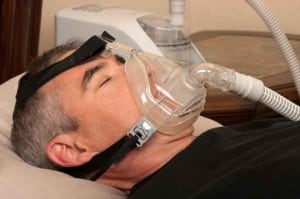What is Sleep Apnea?

Sleep apnea is usually a chronic condition that disrupts your sleep and as a consequence you spend more time in light sleep patterns and less time in deep, restorative sleep. This ultimately leads to excessive daytime sleepiness. Fortunately, treatment options are available.
What are the Different Types?
Obstructive Sleep Apnea (OSA): The most common type of sleep apnea, it is typically caused by a blockage of the airway, usually when the soft tissue in the back of the throat collapses during sleep.
Central Sleep Apnea: This is a less common type of sleep apnea that involves the central nervous system. Unlike OSA, the airway is not blocked, but instead the brain fails to signal the muscles that control breathing.
Complex Sleep Apnea: This is a combination of obstructive sleep apnea and central sleep apnea.
What are the Symptoms of Sleep Apnea?
It can be tough to identify sleep apnea, since the most prominent symptoms only occur when you’re asleep. But you can find out by asking a bed partner to observe your sleep habits, or by recording yourself during sleep.
Sleep apnea symptoms may include:
- Pauses occur while you snore, at times choking or gasping may follow the pauses
- Excessive daytime sleepiness
- Morning headaches
- Memory loss
- Loss of concentration
- Irritability, depression and mood swings
- Dry mouth or sore throat upon wakening
Our snore quiz can help isolate your specific symptoms and plan your consultation.
What are the Risk Factors?
- Excess weight: Fat deposits around your upper airway can obstruct your breathing
- Neck circumference: People with a thicker neck may have a narrower airway
- Narrowed airway: You may have inherited a naturally narrow throat, enlarged tonsils or adenoids may also block your airway
- Gender: Men are twice as likely to have sleep apnea than women
- Age: Sleep apnea occurs more often in adults older than 60
- Family history: If you have family members with sleep apnea, you may be at increased risk
- Race: If you are under the age of 35, African Americans are more likely to have OSA
- Alcohol, sedatives or tranquilizers: Usage of these substances relaxes the muscles in your throat
- Smoking: Smokers are three times more likely to have obstructive sleep apnea than people who have never smoked
- Nasal congestion: If you have difficulty breathing through your nose due to an anatomical problem or allergies, you’re more likely to develop obstructive sleep apnea
What are the warning signs of sleep apnea?
Loud snoring, Observed episodes of stopped breathing while asleep, Abrupt awakening accompanied by gasping or choking, Dry mouth or sore throat upon awakening, Morning headaches, Difficulty concentrating during the day
How do you fix sleep apnea?
Life style changes such as losing weight, CPAP, Surgery, Oral Appliance Therapy,
What is the best sleeping position for someone suffering from sleep apnea
First of all, the worst position is lying on your back while sleeping. Gravity increases the tendency for the jaw, tongue and soft palate to drop back toward the throat, constricting the airway. Sleeping on your side is the best position for people with sleep apnea. Some people find it helpful to use a special contoured pillow to make side sleeping more comfortable.
Is there a way to treat sleep apnea without a CPAP?
Yes, there are several used either alone or in combination. They include:
Achieving or maintaining a healthy weight, altering your sleep position to avoid sleeping on your back, and undergoing surgery to reduce or eliminate the extra tissue in your throat that collapses and blocks the airway during sleep. The most popular and easy to use treatment for sleep apnea without the use of CPAP, is to wear an oral/dental appliance.
What People Say About Us!
After being diagnosed with obstructive sleep apnea, I tried both the c-pap and bi-pap machines with every mask available – with absolutely no success. And then my regular dentist referred me to Dr. Levin…
He is phenomenal! I’ve been using the sleep apparatus with incredible success – my husband says I’ve actually stopped snoring!!!
– Joy
Click here to read more reviews.
Schedule Your Consultation
If you think you may have sleep apnea or are suffering from any of the symptoms listed above, please schedule an appointment or contact us today.
